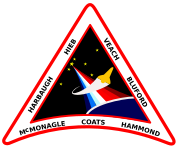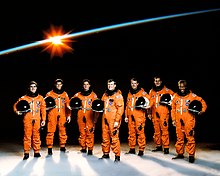STS-39

Discovery launches on STS-39
|
|||||
| Mission type | Research | ||||
|---|---|---|---|---|---|
| Operator | NASA | ||||
| COSPAR ID | 1991-031A | ||||
| SATCAT № | 21242 | ||||
| Mission duration | 8 days, 7 hours, 22 minutes, 23 seconds | ||||
| Distance travelled | 5,584,423 kilometers (3,470,000 mi) | ||||
| Orbits completed | 134 | ||||
| Spacecraft properties | |||||
| Spacecraft | Space Shuttle Discovery | ||||
| Landing mass | 95,846 kilograms (211,304 lb) | ||||
| Payload mass | 5,663 kilograms (12,485 lb) | ||||
| Crew | |||||
| Crew size | 7 | ||||
| Members |
Michael L. Coats L. Blaine Hammond, Jr. Gregory J. Harbaugh Donald R. McMonagle Guion S. Bluford, Jr. Charles L. Veach Richard J. Hieb |
||||
| Start of mission | |||||
| Launch date | 28 April 1991, 11:33:14 UTC | ||||
| Launch site | Kennedy LC-39A | ||||
| End of mission | |||||
| Landing date | 6 May 1991, 18:55:37 UTC | ||||
| Landing site | Kennedy SLF Runway 15 | ||||
| Orbital parameters | |||||
| Reference system | Geocentric | ||||
| Regime | Low Earth | ||||
| Perigee | 248 kilometres (154 mi) | ||||
| Apogee | 263 kilometres (163 mi) | ||||
| Inclination | 57.0 degrees | ||||
| Period | 89.6 minutes | ||||
|
|
|||||


Left to right: Veach, Coats, Harbaugh, McMonagle, Hammond, Hieb, Buford
STS-39 was the twelfth mission of the Space Shuttle Discovery. The primary purpose of the mission was to conduct a variety of payload experiments for the Department of Defense.
Launch was originally scheduled for 9 March, but during processing work at Pad A, significant cracks were found on all four lug hinges on the two external tank umbilical door drive mechanisms. NASA managers opted to roll back the vehicle to the VAB on 7 March, and then to OPF for repair. The faulty hinges were replaced with units taken from orbiter Columbia, and reinforced. Discovery was returned to the pad on 1 April, and the launch was rescheduled for 23 April. The mission was again postponed when, during prelaunch external tank loading, a transducer on high-pressure oxidizer turbopump for main engine number three showed readings out of specification. The transducer and its cable harness were replaced and tested. The launch was rescheduled for 28 April. Actual launch occurred at 28 April 1991, 7:33:14 am EDT. Launch weight: 112,207 kilograms (247,374 lb).
STS-39 was a dedicated Department of Defense mission. Unclassified payload included Air Force Program-675 (AFP675); Infrared Background Signature Survey (IBSS) with Critical Ionization Velocity (CIV), Chemical Release Observation (CRO) and Shuttle Pallet Satellite-II (SPAS-II) experiments; and Space Test Payload-1 (STP-1). Classified payload consisted of Multi-Purpose Release Canister (MPEC). Also on board was Radiation Monitoring Equipment III (RME III) and Cloud Logic to Optimize Use of Defense Systems-1A (CLOUDS-1A).
...
Wikipedia
